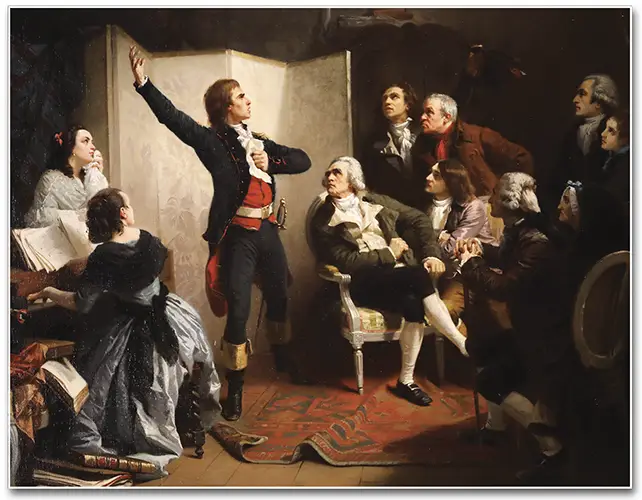Let’s begin with a joke and a laugh: well, sort of.
One day a man is driving his powerful Maserati on the highway, after a while he turns on the radio, and after choosing the station Isoradio, he is amazed to hear the announcer say with bated breath: “Be especially careful on the A1 because a crazy driver is going against the traffic in one of the lanes!” Our man looks up and angrily exclaims: “One? But there are thousands of them!”
This old joke, I think, describes too well the times in which we live, and it confirms, unfortunately, at the same time, how often reality surpasses the imagination: more and more, the subjective choices that we make do not take into account other people, the world we live in, what we really are; and if others do not accept our choices, they are the ones who have problems, who do not understand, who are “crazy”.
In fact, each one of us, sooner or later has the experience of meeting with attitudes and behaviours that have their origin in a pathological self-centeredness or egoism, which their possessors are not even conscious of having, but which appear to them as the unproblematic manifestations of an equivocal ‘sacrosanct freedom’, to do whatsoever they feel or wish to do, rejecting all rules or all general norms of behaviour which in themselves are naturally present in all human hearts – nor could they really be totally absent – for the good of everybody.
Since these rules or norms are perceived as undue limitations on one’s rights, those who see them in this way readily impose on others their own individualistic interests or their own private rules. We have only to look at those who play any kind of role in society, especially those persons who are highest in the social scale, and we see how they take advantage of their positions to boss others around, how they flaunt themselves, how they try to dominate and even exploit others rather than showing gratitude for the opportunity to serve their fellow human beings.
The pathological egoism that holds sway in present-day society is erroneously seen as a manifestation of personal freedom
I could site many examples from all walks of life and from all levels of society, but I willingly leave that task to the reader in the secure knowledge that some new Freuds and Jungs will have much to analyse. Of course, I do not want to judge intentions, but quite often we see paroxysmal behaviours in young people that go beyond a mere lack of good manners and which absolutely ignore the respect due to all persons because of our common human dignity, which is the patrimony of everyone and not of just a privileged few.
Those of us who still try to observe the rules and to maintain a courteous attention and respect to other people or to certain times and places, are looked upon as “intolerant” or excessively rigid, or even as a threat to my freedom or to do whatever I want to do. This is not to say that we ought to accept the Kantian view of freedom which has become part of the DNA of contemporary culture; in other words, my freedom ends where another person’s freedom begins. This way of looking at life, at first sight respectful and understanding towards others, is in reality a limitation on human dignity and freedom.
Man can, in fact, because of his rational and social nature, only be truly free with and for others. For this reason, I think that each one of us, beginning with myself, ought to make a serious daily examination of conscience, according to the Golden Rule given to us by Jesus: “So, do to others whatever you would that others do to you: there you have the Law and the Prophets” (Mt 7:12). All this in order to avoid, as so often happens, being de facto despots and claiming or even blaming others for what has been denied them.
A brief analysis as continuation
Frankly speaking, modernity and our times in particular, are much different from past ages because of an ever more difficult harmonization, to the point now of a stark contrast between the centrality of the human person and the respect (and not mere tolerance, as one might tolerate something unpleasant) for cultural and ethical pluralism, which ends up very often in simple relativism. Generally speaking, especially in some ecclesiastical circles, cultural relativism and ethical pluralism are thought to be the real problems of today, but when we look at the question more closely, we see that these are none other than effects of something else.
Contemporary culture tries to convince us that the conscience is nothing but subjectivism and that truth is based on complete relativism
The real problem is the more and more absolute and intransigent affirmation of an individualistic subjectivity, which translates into ethical subjectivism. This results in a relativism in all our moral evaluations and a fundamentalism that fails to take others into account. Whoever proclaims, as we all do, that we must reassert the primacy of the person and the respect due to him or her, must then deal with the problem of how each person subjectively elaborates that primacy, keeping also in mind the real danger of how each person becomes convinced of his or her “truth” and “values”.
In all this there is the risk – confirmed by experience – of ending in a real ethical subjectivism which undermines the social nature of man. It is, in a certain sense, the re-proposition of that original sin in which man refuses to recognize his creatureliness and falls into the illusion of being his own creator, without accepting the objectivity of his nature created by God with its own rules and inner necessities, and which it is not possible to change into something else without forgetting the words of the prophet: “Woe to him who argues with his Maker, being but a pot among pots. Will the clay say to him who fashions it, ‘What are you making? You have no skill!’” (Is 45:9).

In fact, the harmful and devastating effects that we notice on all levels and in all social environments, derive not so much from ethical and religious pluralism, as from a subjectivity conceived as absolute and infinite that becomes an ethical subjectivism, prisoner of its own self, something that frustrates or corrodes every type of human relationship. This can reach the point of justifying an absurdity: man, a finite being, who pretends to possess infinite freedom!
The real problem is the intransigent affirmation of an individualistic subjectivism, by which everyone affirms their own “truth”
If, therefore, we assert the primacy of the person, we must also be careful about where such an assertion can lead us, especially when it is not correctly formulated or because we do not attentively consider how it might be interpreted by the majority of people. This primacy of the human person can result in each individual elaborating in his interior subjectivity certain ethical choices in purely self-referential ways without any reference to objective truth (whether on the level of reason or religious faith).
And so, in the end, each individual “creates” the truth and establishes what is true and what is false, what is right and what is wrong, what is good and what is evil, what is lawful and what is arbitrary. Furthermore, since the human spirit lives in time, the truth it creates changes according to time and circumstances, thus affirming not only the primacy of relativism, but necessarily also that of historicism.
In fact, the idea of truth today has been replaced by that of change, of progress, of consensus, of desire, of sentiment, of emotion. The widespread conviction that it is impossible for people to arrive at knowledge of the truth, the denial that it is objective and constitutes an inescapable point of comparison, leads practically at all levels to a lack of attention to the essences of things and to considering everything in life in terms of mechanical functioning and mere formality.
The predominant culture of our day inexorably tries to convince us that conscience is nothing more than a subjective fantasy and that truth is purely relative; but, in the end it must face the consequences of such a position and the inevitable conflicts that it produces. The topic of moral conscience is, therefore, more than ever subject to equivocation and to gross misunderstanding, leading to caricatures and to ideological exploitations of it.
In our contemporary culture where everything tends to become more subjective in the sense of freedom of choice understood as something absolute: I do just whatever I want, feel, or desire, whatever makes me feel good, forgetting that this is different from the real good (a drug can produce well-being at a certain moment, but is it the good of the person?), we need to remember and make known that the ‘subjective aspect’ is one of the aspects of the human person who exists with a received nature that he has not created for himself, with all its essential characteristics and necessities which do not permit “subjectivism”, unless individuals and communities are willing to pay a high price.
In other words, we must emphasize that each person is not and cannot be a law unto himself, and thus he cannot act with infinite and absolute aspirations that contradict other person’s rights, closing himself off from others as though he were a monad. The real problem, then, is not so much to reaffirm the primacy of the human person, but ask ourselves: how can we acknowledge and cultivate a given person’s subjectivity in a way that truly respects his own dignity and that of others?
Conclusion: with the Saint of Fontebranda
We can undoubtedly find an answer to our questions in the teachings that Our Lord revealed to St. Catherine and, through her, to us all. The answer consists in a simple, but eloquent and instructive truth that her first biographer recorded: “You are she who is not; I am He who Is.”1 This a truth that we find, of course, in the Old and in the New Testament (Ex 3:14; Jn 18:6). We are, only because God has called us to existence and has entrusted us with a project to complete, granting us the necessary tools to do so; and this is why the apostle Paul says: “What do you possess that you have not received? And, if you have received it, why do you boast as if you had not received it?” (1 Cor 4:7).

Without Him, therefore, we are nothing and can do nothing (cf. Jn 15:5). Each day, each hour, each minute, is a gift from God Who maintains us in existence and grants us the power to act in every moment: You are that which is not and everything is a gift from God, and we shall truly live if each person lives “with the gifts each of you received, thus becoming good managers of the varied graces of God” (1 Pt 4:10). And, “Being stewards, faithfulness shall be demanded of us” (1 Cor 4:2).
The teaching that Our Lord revealed to St. Catherine of Siena gives us the answer: “You are she who is not; I am He who Is.”
Let us meditate on these deep truths and let us pray that the Lord, through the intercession of St. Catherine, may grant to each of us the strength to put them into practice in our daily lives so that our mutual relationships may be in accordance with the nature that has been gifted to us and, therefore, more human and not infected by that delirium of omnipotence which only causes conflicts and ends up in a tremendous, solitary egotism which no mere human effort can ever adequately overcome.
And, though we can accomplish much in this life, we must remember that not everything contributes to our true good (1 Cor 10:23), and above all, no substitute or compensation will ever be able to suffocate our vocation to true Love. “Whoever has ears to hear, let him hear!” (Mk 4:23). ◊
Taken from the Heralds of the Gospel magazine, #196.
Notes
1 BLESSED RAYMOND OF CAPUA. St. Catherine of Siena, Siena 1978, Lib. I, Cap. X, p.105.

